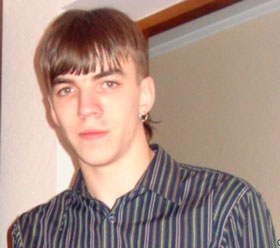Political prisoner Artsiom Prakapenka denied pardon
On April 17, political prisoner Artsiom Prakapenka phoned his family from the Mahilioŭ prison and said that he had been shown a response from the commission for pardon that rejected his request without explanation. Artsiom Prakapenka says he was not allowed to have a copy of the document.
The political prisoner petitioned for clemency back in February 2015. Earlier, President Lukashenka publicly promised that he would sign any incoming requests for pardon from political prisoners.
The situation is commented by Anastasiya Loika, lawyer of the Human Rights Center "Viasna":
“First, I would like to remind the circumstances of Artsiom Prakapenka’s conviction. On 16 October 2010, he, together with Yauhen Vaskovich and Pavel Syramolatau, decided to make a symbolic protest against the pressure on social activists and representatives of the anarchist movement in the so-called “case of Minsk anarchists”.
However, from a human rights point of view the protest was not peaceful: two activists threw two Molotov cocktails at the KGB building in Babrujsk, damaging the building in the amount of 253,636 BYR. Artsiom Prakapenka was shooting the action with a camcorder.
The youths were detained on 17 January 2011, but were promised to be released after they admitted their guilt (intended arson of the entire building). Under pressure from investigators the testimony appeared in the interrogation records, and the case was qualified as an attempt to damage property on a large scale (Part 3 of Article 218 of the Criminal Code), which together with Article 339 of the Criminal Code (“hooliganism”) resulted in a severe punishment (from 7 years of imprisonment).
In court, the three young men pleaded guilty only of the hooliganism charges, with no intent to arson the building. However, they were judged under the charges brought by the preliminary investigation and sentenced to 7 years in prison each.
Human rights activists did not welcome such a form of expression for any reason, but noted serious violations in the course of the investigation, excessively heavy charges and a harsh sentence for political reasons, thus recognizing the young people as political prisoners.
After the sentencing, Artsiom Prakapenka, as well as other political prisoners, encountered regular harassment with an aim to force him to write a request for pardon. In 2012, Pavel Syramolatau submitted a petition for pardon and was soon released.
Artsiom Prakapenka also faced disciplinary penalties for acts not penalized for other prisoners. As a result, over the years the prisoner has had the status of an “offender”.
The fact that the political prisoner was not released as a result of writing a petition for clemency can only be explained by the political situation: on the one hand the presidential election is approaching, and on the other – the passive and inconsistent position of European politicians regarding the fate of some of the political prisoners (Artsiom Prakapenka, Yauhen Vaskovich, Yury Rubtsou).
I should remind that Artsiom Prakapenka’s sentence ends on 17 January 2018, and he cannot enjoy the amnesty law because of the severe charges and the “offender” status."


















